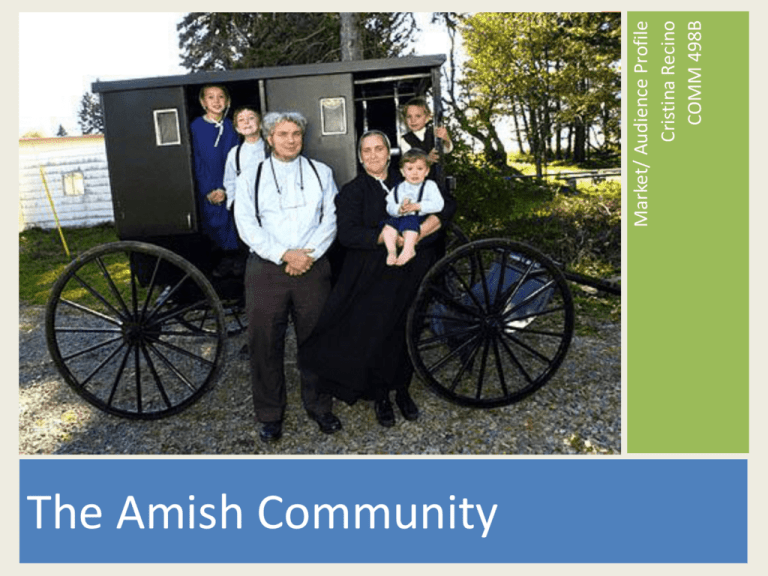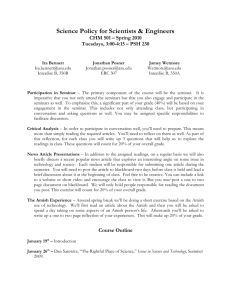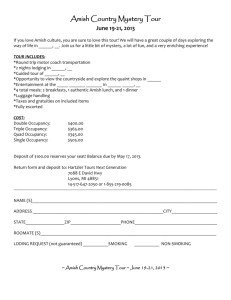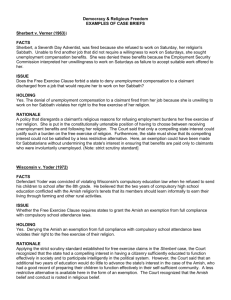Market Profile
advertisement

The Amish Community Market/ Audience Profile Cristina Recino COMM 498B Amish By Numbers Historical population Year Pop. ±% 1920 5,000 — 1928 7,000 +40.0% 1936 9,000 +28.6% 1944 13,000 +44.4% 1952 19,000 +46.2% 1960 28,000 +47.4% 1968 39,000 +39.3% 1976 57,000 +46.2% 1984 84,000 +47.4% 1992 125,000 +48.8% 2000 166,000 +32.8% 2008 221,000 +33.1% 2010 249,000 +12.7% US Populationssources: 221,000 in 2008;[6] 249,000 in 2010.[1] It’s very difficult to put an exact number on the Amish population. Since members of this community get baptized no sooner than age 18 children are not counted in local congregation numbers. An estimate from Ohio State researchers says there are approximately 251,000 Amish people in the U.S and Canada. Researchers predict the population every 18-20 years. The Amish are among the fastest-growing populations in the world; Ohio State researchers a new community is formed every 3 and a half weeks. There is an estimated 3.6% population increase every year from 1992 to 2000. Where The Amish Live The Amish community traditionally lives in places like Lancaster, Pennsylvania but as their populations increase, so does their presence on the map. The Amish live in settlements of 2040 families and these settlements are popping up all over the country- from New York to Missouri and Wyoming. The strongest growth is in the east coast, where 47 settlements are in New York and 18 have been founded since 2009. Joseph Donnermeyer, a professor of rural sociology at OSU, says, “New York is now the hotspot.” Changing agricultural economics is also driving people to new lands. Amish families can be found across 30 states from Montana to Florida in 456 separate settlements. Number of Amish Adherents by State, 2010 Why Such Rapid Growth? Much of the growth seen in the population of Amish communities has to due with the fact that many children are staying with the religion and are starting their own families with many children. The Amish have an average of seven children per family. "Some people would claim 90 percent of daughters and sons get baptized Amish and start families," says lead researcher Joseph. He also says that the Amish are great at socializing their sons and daughters into their faith. Family Income Typical Amish Jobs: -Farming -At-home shops -Quilt making -Roadside stands -Furniture making The average income for an Amish family is $37,000. In the Amish community, wealth stems from real estate and a lot of the wealth families acquire has been created by rising real estate values. An Amish family does not spend as much on food, clothing, entertainment, transportation and gadgets, as the rest of America, so a small income goes a long way. Cash and barter are used as much as possible and since the Amish don’t borrow they don’t pay interest. The Amish are firm believers in the community mindset of problem solving and crisis management. “Family and community are their bank and their insurance company.” They believe it is their duty to help those in need. Amish and the Government Contrary to popular belief, Amish families DO pay taxes. They pay: state and federal income taxes, sales and real estate taxes, and public school taxes. Sometimes the Amish pay both public school taxes and taxes to their private Amish schools. The Amish do not pay Social Security taxes, because they consider Social Security a form of insurance and refuse its benefits. The Amish are taught to respect and pray for governing authorities and cite the scripture verse “Obey God rather than men” (Acts 5:29). They forbid self-defense as well as entering the armed forces, but will often consult and cooperate with local officials. The Amish are permitted to vote in elections, although voting rates are very low among the community. In addition, they rarely take assistance from the government financially, since unemployment is so low. The myth that the Amish don’t pay taxes is the biggest misconception within their community. The Amish and Technology Another misconception about the Amish community is that they reject technology altogether. It is better to say they use technology selectively. Televisions, radios, and personal computers are rejected outright, but other types of technology are modified to fit the Amish lifestyle. For example, the Amish buy technologies such as gas grills, shop tools, camping equipment and some farm equipment. The Amish reject the use of any electricity and only use gas lamps, but in some settlements Amish use batteries to power lights on things such as buggies, calculators, fans, flashlights, cash registers, copy machines, and typewriters. Solar energy is sometimes used to charge batteries, operate electric fences, and power How The Amish Stay Connected Although the Amish don’t use modern technology, they still maintain staying connected with one another and a system of relaying news. Since they reject the use of technology, they are focused more on person-to-person communication. For example, at the farm produce sale people catch up on news. Women also have quilting get- together. Letter writing is used in Amish communities to keep in touch with relatives and friends Another way to keep in touch is through the Amish newspaper. For example in Ohio "The Budget" has been published in Sugarcreek since 1890. Amish and Mennonite scribes, as they are called, from all over the country write weekly updates on the happenings in their area. Sample writing topics in “The Budget:” New births Storm damage Farming stories http://www.thebudgetnewspaper.com/ The Amish and The Media Most Amish consider posing for photographs to be an unacceptable act of pride and do not allow pictures of themselves. They prefer to steer clear of any type of the attention. They understand that there are some stories about their community that need to be covered in the media, but they don’t want to be a part of it. They fear mass media technology would introduce foreign values into their culture. They believe that no member should be the center of attention, whether for doing good or bad. The Amish culture is centered on community, not individuality. If they do agree to a rare journalistic interview, Amish do not want their faces shown on television or in the newspaper. On a child’s toy doll, faces are not embroidered onto the doll’s face to emphasize that in God’s eyes, all are equal. The Horse and Buggy The idea behind traveling by horse and buggy stems from the belief that cars would pull the community apart. They believe owning cars would encourage the Amish youth to leave and go to the cities. They also believe horse and buggy transportation keeps the community anchored geographically. The horse and buggy serves as a literal break to life and slows down the pace of life. It’s also a symbol of their separation from the modern world. With the exception of air travel, the Amish are permitted to use public transportation like buses and trains. The Amish and Education The Amish community typically does not educate their children past the 8 th grade. The majority of kids go to one- or two-room schools that are taught by an Amish mother. Three to five local fathers organizes the school, hire a teacher, approve the curriculum, oversee the budget, and supervise maintenance. School focuses on basic reading, writing, math and geography, along with vocational training and socialization in Amish history and values. Those that want to attend college are usually excommunicated from the Amish community. Amish Values & Fashion Choices I must be a Christian child, Gentle, patient, meek, and mild; Must be honest, simple, true In my words and actions too. I must cheerfully obey, Giving up my will and way. -A traditional Amish school verse The Amish value family, community, simplicity and devotion to God. Their traditional dress is a symbol of this. Amish attire halts individual expression through fashion. They believe that God calls them to be different from society and their dress easily makes them separate from the English world. Women wear a long, ankle length dress with an apron in front. Black stockings are usually worn underneath the dress. Women keep their hair in a bun or braided under a black or white cap (prayer Kapp). Makeup and jewelry are avoided. See the verse bellow: "In like manner also, that women adorn themselves in modest apparel, with shamefacedness and sobriety; not with braided hair, or gold or pearls, or costly array. But that which becometh women professing godliness.”- I Tim. 2: 9,10 Men typically wear a button-down collared shirt and trousers. They also almost always wear a wide brimmed hat. In most Amish communities the men who are married keep a beard, but they do not have a mustache. Single Amish men keep their face shaven until their wedding day. Amish values vs. Modern values: Religious Beliefs The Amish faith is a group of traditionalist Christians that form a subgroup in the Mennonite churches. The Amish submit themselves to the will of Jesus and the church focuses on: Hochmut (pride, arrogance, haughtiness Demut (humility) Gelassenheit (submission, letting be, calmness) Baptism occurs between the ages of 16 and 25. You must be baptized to be married and once you are baptized you are only allowed to marry within the Amish community. During adolescence, teens are sent on Rumspringa- a chance for teens to experience the English world and be emerged in the culture of modern society. If a teen decides not to come back to the Amish community after Rumspringa, they are excommunicated and are sunned from the community and cannot have social interaction with their family or friends.






